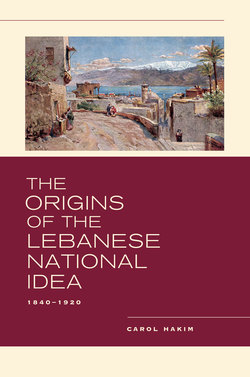The Origins of the Lebanese National Idea

Реклама. ООО «ЛитРес», ИНН: 7719571260.
Оглавление
Carol Hakim. The Origins of the Lebanese National Idea
Отрывок из книги
THE ORIGINS OF THE LEBANESE NATIONAL IDEA
The publisher also gratefully acknowledges the generous support of the Humanities Endowment Fund of the University of California Press Foundation.
.....
When he wrote these lines, Bourrée may also have had in mind his own role during the events of 1840. Trying hard to conciliate the contradictory terms of French policy in the Levant, at the time divided between its traditional protectorate over the Catholics, which he deemed greatly endangered by a French stand opposed to the Maronite rebellion against Egyptian rule, and the French government's decision to safeguard the Egyptian hold over Syria,59 Bourrée came up with a proposal that he conveyed to Paris. The importance of this “plan,” as he called it, lay in the fact that the idea of establishing an independent Catholic principality in Mount Lebanon, under the protection of France, apparently then made its first and explicit appearance on the local scene. “These dangers,” he wrote, “would all vanish with the recognized independence of the Prince of Lebanon, with the creation, finally, of a Catholic principality that would be independent or merely required to perform a few acts of vassalage.” Such an entity, he added, would allow France “without convention or treaty or title but by the very necessity of things, to become the natural protector of the Christian Catholic emir.”60
Bourrée then expounded personally, and on his own initiative, this idea to Emir Bashir II, who, quite practically, objected to his exalted interlocutor that Mount Lebanon could not become independent without the adjunction of a port and the Bekaa Valley for its supply of grain.61 Bourrée did not mention whether he ever communicated his “plan” to any representative of the Maronite clergy or to other Lebanese parties. Given his enthusiasm for the cause of the Maronite rebels, it is quite probable that this project was conveyed to other Lebanese parties directly by him or by Father Ryllo, who, according to Bourrée, attended the meeting between Bashir II and the French consul at which this idea was advanced. At any rate Bourrée was firmly disavowed by his government, Thiers qualifying his project as “chimeras . . . which are insignificant next to the interest that we have in seeing Syria subdued and brought back under the authority of Muhammad Ali.”62
.....